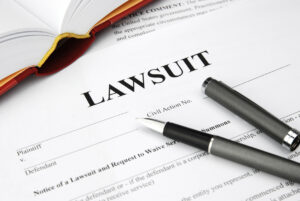Although they are similar, a claim and a lawsuit are not the same. Almost all personal injury claims are settled without the need to file a lawsuit, even though nearly all lawsuits start as claims. An Atlanta personal injury lawyer can help you determine if you have a claim or a lawsuit.
What is a Claim?

A claim is a demand for remedy, typically monetary compensation, from someone else based on negligence or another cause of action. For example, if someone broadsides your car and injures you, you can assert two claims–one for property damage and one for personal injury.
What is a Lawsuit?

A lawsuit is a formal legal action in which you enlist the court’s assistance to establish the defendant’s liability and obtain a remedy – usually compensation. The def
endant might be the at-fault party, or they might not be. For example, you might sue an employer for the on-duty misconduct of their employee.
While the ultimate conclusion of a lawsuit can be a trial, parties often settle their disputes before reaching that stage.
How to Initiate a Personal Injury Claim
Below are some explanations of the various steps involved in filing and pursuing a personal injury case.
Send a Demand Letter
The traditional way of initiating a personal injury claim is by sending a demand letter to the party responsible for paying – typically an insurance company. The demand letter outlines the basis for the claim and may demand a specific amount of money, with a deadline for a response.
You will need to send supporting evidence along with your demand letter – such as copies of your medical bills and records. Your lawyer will know how to craft an effective demand letter.
The recipient might ignore your letter. If they do, you can file a lawsuit to let them know that you’re serious about pursuing your claim. However, they are more likely to respond with a lowball offer – a settlement offer for much less than the actual value of your claim. That’s okay because at least it kicks off negotiations.
Engage in Negotiations
Negotiations can last a long time, or they can last a short time. If you’re negotiating against an insurance company, be aware that adjusters are professional negotiators. You should ask your lawyer to negotiate on your behalf to even the playing field.
How to File a Personal Injury Lawsuit
You file a lawsuit by completing the following steps:
- File a written complaint with the court clerk
- File a summons
- Pay the filing fee
- Arrange for a professional process server to deliver the documents to the defendant
Once you complete these steps, you have met the statute of limitations deadline as long as you filed within the applicable timeframe.
Pretrial Discovery
Both sides use pretrial discovery to demand evidence from the other side. For example, in a truck accident case, you might want a copy of the defendant’s logbook to check for regulatory violations. The defendant, by contrast, might want you to submit to a medical examination of your injuries conducted by a doctor of their choice.
Mediation
Once you file a lawsuit, the court might pressure you to participate in mediation. Mediators are trained third parties who will help both sides seek a compromise settlement. The judge might refuse to schedule a trial until you at least try mediation.
Reaching a Personal Injury Settlement or Going To Trial
You can resolve your lawsuit in one of two ways: settlement or trial.
Settlement
To finalize a settlement, you need to sign a settlement agreement. Once both parties sign, it functions as a binding legal contract. If the defendant refuses to honor their obligations, you can take them to court over it. In that case, your lawsuit will not be a personal injury lawsuit–it will be a breach of contract lawsuit.
Trial
Trials work like this:
- Voir dire: A competitive process of jury selection
- Opening statements by both parties’ lawyers
- Filing various motions, such as a motion to suppress inadmissible evidence
- Questioning and cross-examining witnesses
- Closing statements
- Jury instructions
- Jury deliberation
- The jury’s final verdict
You can still settle your claim at any time before the final verdict.
A Georgia Personal Injury Lawyer Can Help You With Your Claim or Lawsuit
You might not need a lawyer after a minor accident. However, if you believe you have a personal injury claim of substantial value or have any doubts, you should consult a Georgia personal injury attorney at Hammers Car Accident & Personal Injury Lawyers.
Personal injury lawyers almost always offer free initial consultations where you can ask questions and explore your legal options. The sooner you involve a lawyer, the more help they will be able to offer you. Contact us today to get legal assistance from our team at (770) 900-9000.
